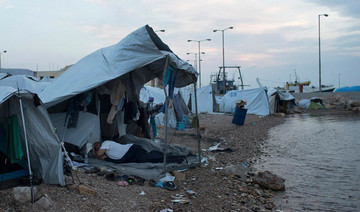AYETORO, Nigeria: The coastal Nigerian community of Ayetoro was founded decades ago and nicknamed “Happy City,” meant to be a Christian utopia that would be sinless and classless. But now its remaining residents can do little against the rising sea.
Buildings have sunk into the Atlantic Ocean, an increasingly common image along the vulnerable West African coast. Old timber pokes from the waves like rotten teeth. Shattered foundations line the shore. Waves break against abandoned electrical poles.
For years, low-lying nations have warned the world about the existential threat of rising seas. Nigeria, Africa’s most populous country, struggles to respond. Some plans to address shoreline protection, even for Ayetoro, have come to nothing in a nation where corruption and mismanagement is widespread.
Prayers against the rising sea are “on the lips of everybody” in the church every Sunday, according to youth leader Thompson Akingboye. But they know the solution will require far more.
Even the church has been relocated away from the sea, twice. “The present location is now also threatened, with the sea just 30 meters (98 feet) away,” Akingboye said.
Thousands of people have left. Of those who remain, Stephen Tunlese can only gaze from a distance at the remnants of his clothing shop.
Tunlese said he lost an investment of eight million naira, or the equivalent of $5,500, to the sea. Now he adapts to a watery future. He repairs canoes.
“I will stay in Ayetoro because this is my father’s land, this is heritage land,” he said.
The Mahin mud coast where the community is slipping away has lost more than 10 square kilometers, or nearly 60 percent of its land, to the ocean in the past three decades.
Researchers studying satellite imagery of Nigeria’s coast say a number of things are contributing to Ayetoro’s disappearance.
Underwater oil drilling is one reason, according to marine geologist Olusegun Dada, a professor at the Federal University of Technology in Akure who has studied years of satellite imagery. As resources are extracted, the ground can sink.
But he and colleagues note other reasons, including the deforestation of mangroves that help anchor the earth and the erosion caused by ocean waves.

A damage house is seen due to coastal erosion in Ayetoro, a coastal community more than 200 km southeast of Nigeria's business capital Lagos. (AP)
“When we started coming to this community, then we used to have fresh water,” Dada said. Today, the freshwater ecosystem is transforming into a salty, marine one.
The transformation is enormously costly in Nigeria. The World Bank in a 2020 report estimated the cost of coastal degradation in three other coastal Nigerian states — nearby Lagos, Delta and Cross River — at $9.7 billion, or more than 2 percent of the country’s GDP. It looked at erosion, flooding, mangrove loss and pollution, and noted the high rate of urbanization.
And yet dramatic images of coastal communities slipping away only capture Nigeria’s attention from time to time, as when the annual flooding occurs — another effect of climate change.
But Ayetoro residents can’t turn away.
“Ayetoro was like a paradise, a city where everyone lived joyfully, happily,” said Arowolo Mofeoluwa, a retired civil servant.
She estimated that two-thirds of the community has been slowly swept under the waves, along with some residents’ multiple attempts to rebuild.
“This is the third house we are living in, and there are some living in the fourth house now, and we do not have enough space for ourselves again. Four or five people living in a small room, you can just imagine how painful it is,” Mofeoluwa said.
“If you look where the sea is now, that is the end of the former Ayetoro.”

A man rides a boat on the waters of Ayetoro, a Nigerian coastal community that has been experiencing coastal erosion for many years. (AP)
For the community’s traditional leader and head of the local church, Oluwambe Ojagbohunmi, the pain is not only in the loss of land but also “what we are losing in our socio-cultural and religious identity.”
Some residents say even burial grounds have been washed away.
Early this year, the Ondo state government announced a commitment to finding “lasting solutions” to the threat to Ayetoro. But residents said that’s been vowed in the past.
It might be too late for efforts to be effective, Dada said. For years, he has hoped for an environmental survey to be carried out to better understand what’s causing the community’s disappearance. But that’s been in vain.
The Niger Delta Development Commission, a government body meant in part to address environmental and other issues caused by oil exploration, didn’t respond to questions from The Associated Press about efforts to protect the community’s shoreline.
The commission’s website lists a shoreline protection project in Ayetoro. A photo shows a sign marking the feat with the motto, “Determined to make a difference!”
The project was awarded two decades ago. Project status: “Ongoing.”
Residents say nothing ever started.
“Help will come one day, we believe,” youth leader Akingboye said.


























